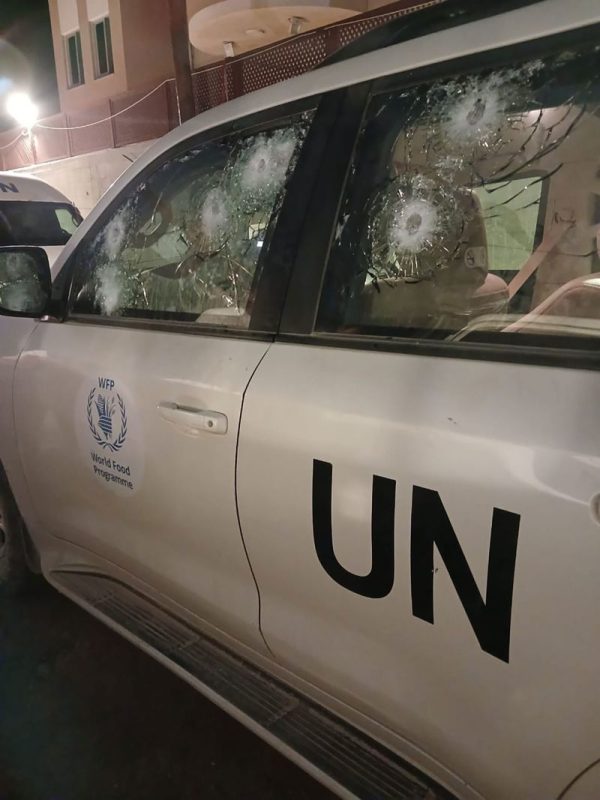The World Food Programme is freezing employee movement in Gaza after one of its vehicles was targeted with repeated gunfire just meters from an Israeli checkpoint, according to a statement by the humanitarian agency.
“Despite being clearly marked and receiving multiple clearances by Israeli authorities to approach, the vehicle was directly struck by gunfire as it was moving toward an Israel Defense Forces (IDF) checkpoint,” the statement by the agency read.
The armored vehicle was one of two returning from a mission escorting humanitarian aid through the Palestinian enclave. A photo released by the WFP showed multiple bullet marks in the driver’s side window; at least 10 bullets hit the vehicle, according to the agency.
None of the employees onboard were physically harmed, it said.
The World Food Programme is the UN’s main food relief agency, and a key pillar of the humanitarian aid network in besieged Gaza, distributing food throughout the devastated territory, where famine has been spreading for months.
Humanitarian workers typically coordinate their routes with Israeli forces in order to move with relative safety. “As last night’s events show, the current deconfliction system is failing and this cannot go on any longer,” WFP Executive Director Cindy McCain said in the statement.
In April, aid workers from another hunger relief group, the World Central Kitchen, were killed in an Israeli attack while traveling through Gaza by car, despite coordinating with Israeli authorities on their route and itinerary. The airstrikes hit three cars in their convoy, killing three Britons, a Palestinian, a US-Canadian dual citizen, an Australian, and a Pole.
In a press briefing Wednesday, the UN Secretary General’s spokesperson Stephane Dujarric said the WFP aid vehicle that was shot had been clearly marked, describing the WFP logo as “probably one of the most recognizable in the world” in conflict zones.
He said the UN had formally protested to Israel over the incident and emphasized the responsibility of United Nations member states to protect UN aid workers, who serve populations in some of the world’s most dangerous places.
“Whether it’s Gaza, whether it’s in Sudan, whether it’s in Chad, whether it’s anywhere else or in Ukraine, in places of fighting, they don’t operate on the whims of (Secretary General) Antonio Guterres,” he said.
“They operate on behalf of the United Nations… It is incumbent on all member states who are part of this organization to ensure the protection of humanitarian workers who work for them, so to speak.”
Pressure is mounting on Hamas, which governs Gaza, and Israeli Prime Minister Benjamin Netanyahu to seal a ceasefire and hostage release deal against the backdrop of severe starvation, dire water shortages, mass displacement and disease in the enclave.
Israel’s military campaign in Gaza has killed at least 40,435 Palestinians and injured another 93,534 people, according to the Ministry of Health there. The Israeli military launched its aerial and ground assault in the isolated enclave after Hamas attacked southern Israel on October 7, killing around 1,200 people and abducting more than 250, according to Israeli authorities.

